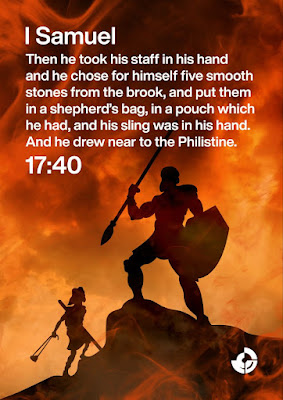”As soon as Saul saw David go out against the Philistine, he said to Abner, the commander of the army, “Abner, whose son is this youth?” And Abner said, “As your soul lives, O king, I do not know.” And the king said, “Inquire whose son the boy is.” And as soon as David returned from the striking down of the Philistine, Abner took him, and brought him before Saul with the head of the Philistine in his hand. And Saul said to him, “Whose son are you, young man?” And David answered, “I am the son of your servant Jesse the Bethlehemite.”“
1 Samuel 17:55-58 ESV
a. Inquire whose son this young man is: This doesn’t mean that Saul did not recognize David. Perhaps Saul did recognize David, and he simply asked about David’s family background (inquire whose son this young man is). Saul promised his daughter to the man who killed Goliath, and Saul wanted to know something about his future son-in-law.
i. Or, it may be that Saul indeed did not recognize David. Some think that David played behind a screen or a curtain for Saul so Saul never saw his face. Others think that because of the distressing spirit, Saul was not entirely in his right mind. We also know that David did not spend all his time at the palace but went home to tend sheep (1 Samuel 17:15). It’s possible that David’s appearance changed during a time when he was away from Saul, so Saul didn’t immediately recognize him. When Saul called David a “young man” the word means someone who is full-grown, mature, and ready to marry.
b. David returned from the slaughter of the Philistine: David won a great victory, but not greater than the victory Jesus won at the cross. David’s victory over Goliath is a “picture in advance” of the victory Jesus won for His people.
· Both David and Jesus represented their people. Under the proposal of 1 Samuel 17:8-9, whatever happened to Goliath would happen to the Philistines, and whatever happened to the Israelite who fought Goliath would happen to the Israelites.
· Both David and Jesus fought the battle on ground that rightfully belonged to God’s people, ground they had lost.
· Both David and Jesus fought when their enemy was able to dominate the people of God through fear and intimidation alone.
· Both David and Jesus were sent to the battleground by their father (1 Samuel 17:17).
· Both David and Jesus were scorned and rejected by their brethren.
· Both David and Jesus fought the battle without concern for human strategies or conventional wisdom.
· Both David and Jesus won the battle but saw that their enemies did not then give up willingly.
· Both David and Jesus fought a battle where victory was assured even before the battle started. (Guzik)
Who’s Son?
Guzik’s comparison of David to Jesus is enlightening and interesting!
After being chided by his older brother, I wonder what his brothers thought of their youngest brother now?
I’ve always enjoyed the history of David and Goliath but more so since my parents told me that I was named after king David. If you study David, you will see that he was a sinner too, as he committed adultery and murder and when he admitted his sin, the Lord forgave him even though he had consequences because of his sin.
”“For God so loved the world, that he gave his only Son, that whoever believes in him should not perish but have eternal life.“
John 3:16 ESV
I am eternally grateful for Jesus who cleansed me of my sins!
Are you?
Blessings





